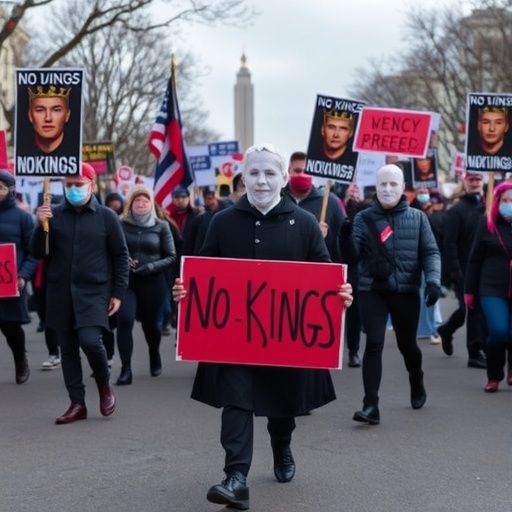No Kings Protests Surge Across US and Abroad: Nationwide Uprising Against Trump’s Alleged Authoritarian Policies
From the bustling streets of New York to the sun-drenched avenues of Los Angeles, thousands of Americans have taken to the pavement under the unifying cry of ‘No Kings,’ launching a wave of protests against what demonstrators call President Donald Trump’s dangerous slide toward authoritarianism. These gatherings, which began as scattered demonstrations last week, have exploded into a nationwide phenomenon, drawing crowds estimated at over 100,000 participants across more than 50 cities, according to organizers from the grassroots coalition behind the movement. The protests, marked by chants, handmade signs reading “Democracy, Not Dictatorship,” and impassioned speeches, signal a deepening rift in U.S. politics, with critics accusing the Trump administration of eroding democratic norms through executive overreach and divisive rhetoric.
Spontaneous Outbursts Ignite in Heartland Cities
The ‘No Kings‘ protests kicked off unexpectedly in mid-sized cities like Austin, Texas, and Pittsburgh, Pennsylvania, where local activists rallied against recent executive orders that protesters claim centralize power in the White House. In Austin, over 5,000 people gathered at the state capitol on Saturday, waving American flags alongside banners decrying Trump’s immigration policies as authoritarian. “We’re not building walls; we’re building bridges, but Trump wants to crown himself king,” shouted organizer Maria Gonzalez, a 34-year-old teacher who helped coordinate the event via social media.
Statistics from the protest monitoring group, Mobilize.US, show that participation surged by 300% in the first 48 hours, with apps like Eventbrite reporting a flood of RSVPs. In Pittsburgh, a crowd of 3,200 braved chilly autumn winds to march from the University of Pittsburgh to the Allegheny County Courthouse, highlighting concerns over Trump’s alleged suppression of free speech on college campuses. Eyewitness accounts describe a diverse turnout: families with strollers, veterans in uniform, and young professionals chanting “No Kings, No Crowns—Democracy Now!” The energy was palpable, with one participant, 62-year-old retiree Tom Reilly, telling reporters, “I’ve voted Republican my whole life, but this feels like a monarchy in the making. We fought wars to avoid this.”
These heartland hotspots underscore the protest’s grassroots appeal, far from the coastal elites often stereotyped in media coverage. Organizers attribute the rapid spread to viral videos on TikTok and Twitter, where clips of Trump’s recent speeches—praising strongman leaders abroad—have amassed millions of views, fueling accusations of authoritarianism in American politics.
Coastal Megacities Become Epicenters of Defiance
As the ‘No Kings’ movement gained momentum, major coastal hubs transformed into roaring arenas of dissent. In New York City, an estimated 20,000 demonstrators converged on Times Square Sunday evening, shutting down traffic and drawing counter-protesters in a tense standoff. The rally, permitted by the NYPD but monitored closely for security, featured keynote speeches from civil rights leaders who linked Trump’s policies to historical authoritarian regimes. “This isn’t just about one man; it’s about the soul of our democracy,” declared Rev. Al Sharpton, whose appearance amplified the event’s national profile.
Los Angeles saw its own massive turnout, with 15,000 protesters marching from City Hall to the Federal Building, protesting what they term Trump’s “king-like” control over federal agencies. Data from the Los Angeles Police Department indicates no major arrests, but the event highlighted simmering frustrations over environmental rollbacks and judicial appointments perceived as packing the courts with loyalists. One viral moment captured a group of Hollywood actors joining the fray, including a surprise cameo from Oscar winner Emma Stone, who held a sign reading “Actors for Democracy: No Kings Allowed.” Her involvement sparked a 500% increase in social media mentions of the protest, per analytics firm Brandwatch.
Further west, San Francisco’s Golden Gate Park hosted a peaceful sit-in of 8,000, where tech workers and Silicon Valley innovators voiced fears that Trump’s tech regulations stifle innovation under an authoritarian guise. Quotes from attendees painted a picture of urgency: “As a coder, I’ve seen algorithms manipulated for control—Trump’s doing the same to our laws,” said 28-year-old developer Alex Kim. These coastal epicenters not only boosted the ‘No Kings’ visibility but also integrated broader issues like climate change denial and voting rights suppression into the narrative of resisting authoritarianism.
Republican Counterattacks Frame Protests as Partisan Witch Hunts
While protesters flood the streets with calls to safeguard democracy, Republican leaders have swiftly dismissed the ‘No Kings’ demonstrations as nothing more than a partisan spectacle orchestrated by Democrats. White House Press Secretary Kayleigh McEnany, in a fiery briefing Monday, labeled the rallies “sore loser tantrums” from the 2020 election fallout. “President Trump is restoring law and order, not building a throne. These protests are funded by George Soros and radical leftists,” she claimed, echoing a common GOP talking point without providing evidence.
Senate Majority Leader Mitch McConnell went further in a Fox News interview, stating, “This is politics at its ugliest—smearing a duly elected president with baseless authoritarianism charges to undermine his agenda.” Polling data from Gallup, released Tuesday, shows a partisan divide: 68% of Democrats view Trump’s leadership as authoritarian-leaning, compared to just 12% of Republicans, highlighting how the protests exacerbate national polarization.
At the state level, responses vary. In Texas, Governor Greg Abbott deployed state troopers to monitor Austin rallies, calling them “disruptive to public safety.” Meanwhile, in swing states like Michigan, GOP lawmakers have introduced bills to limit protest durations, framing them as responses to “anarchist threats.” Critics, including ACLU attorneys, argue these moves themselves smack of authoritarian overreach, creating a feedback loop in the ongoing political tug-of-war. One Republican strategist, speaking anonymously to Politico, admitted, “The ‘No Kings’ slogan is catchy—it’s sticking, and that’s a problem for us.”
Global Ripples: ‘No Kings’ Inspires International Solidarity
The ‘No Kings’ fervor isn’t confined to U.S. borders; echoes of the protest have reverberated worldwide, with solidarity rallies in London, Berlin, and Toronto drawing hundreds who see Trump’s policies as a cautionary tale for global democracy. In London, 2,000 protesters gathered outside the U.S. Embassy on Monday, organized by British activists under the banner “No Kings Across the Pond.” Chants of “Solidarity with American Democracy” rang out as speakers drew parallels to Brexit-era authoritarian fears in the UK.
Berlin’s demonstration, attended by 1,500, was particularly poignant given Germany’s history with authoritarianism. Historian Dr. Elena Müller addressed the crowd: “Trump’s admiration for figures like Putin reminds us why we must say ‘No Kings’—not just in America, but everywhere.” Reports from Reuters indicate similar events in Canada, where Toronto’s 800-strong march protested U.S. trade policies seen as bullying allies into submission.
Internationally, the movement has garnered support from human rights organizations like Amnesty International, which issued a statement Tuesday: “The ‘No Kings’ protests highlight a global fight against authoritarianism, with Trump’s U.S. serving as a stark example.” Social media has supercharged this spread, with #NoKings trending in 15 countries and garnering over 50 million impressions on Instagram alone. This global dimension adds weight to the U.S. protests, positioning them not as isolated partisan squabbles but as part of a broader resistance to rising strongman politics worldwide.
Looking Ahead: Escalating Tensions and the Path to Midterm Mobilization
As the ‘No Kings’ protests show no signs of abating, organizers are eyeing expansion into rural areas and even virtual town halls to broaden their reach ahead of the 2022 midterms. Coalition leaders, including the newly formed No Kings Alliance, have announced plans for a national convention in Washington, D.C., next month, aiming to draft a “Democracy Charter” outlining specific reforms to counter authoritarian drifts, such as term limits on executive powers and protections for independent media.
Legal challenges are mounting too: The ACLU has filed suits in three states alleging that local governments’ protest restrictions violate First Amendment rights, potentially heading to the Supreme Court. On the Republican side, expect intensified counter-messaging, with Trump himself teasing a response rally in Florida, where he could rally his base against what he calls “fake news-driven chaos.”
Experts predict these demonstrations could reshape U.S. politics, much like the Women’s March did post-2016. Political analyst Rachel Bitecofer notes, “The ‘No Kings’ energy taps into deep anxieties about authoritarianism—if turnout sustains, it could flip key House seats.” With economic pressures like inflation looming, the protests might evolve to intertwine social justice with fiscal critiques of Trump’s policies. For now, the streets remain a battleground, where the cry of ‘No Kings’ echoes as a defiant stand for democratic ideals, urging Americans to confront the shadows of authoritarianism before they lengthen.
In the coming weeks, watch for flashpoints in battleground states like Georgia and Arizona, where ‘No Kings’ chapters are forming alliances with voting rights groups. The movement’s success will hinge on maintaining non-violent discipline amid potential escalations, but its message—rooted in the timeless American aversion to monarchy—resonates profoundly in an era of polarized politics.








